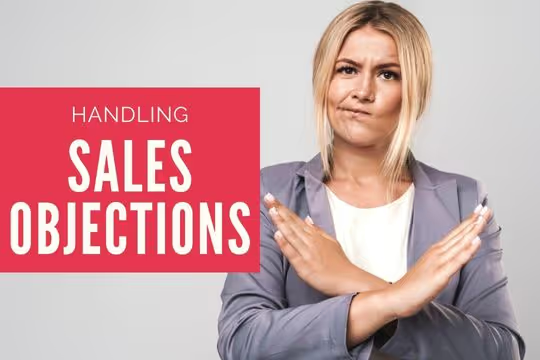

Sales objections are inevitable when selling a product or service. Sales reps hear them every day, and business owners hear them all the time. Business owners who learn how to handle sales objections will be better equipped to train their sales teams so they can close more deals.
While some sales reps learn how to overcome these objections on the fly, other reps need some help. In this article, we'll go over some common sales objections and how you can respond confidently—even if you're unsure of the best response for that objection.

Have you been on the phone with a prospect, and the pitch is going smoothly, but then an objection pops up? Maybe they don’t agree with your pricing, features, or benefits, and you see the deal slipping away. This can negatively impact your mental health, especially if you're running a start-up making it difficult to stay healthy while running a business.
Rather than allowing these objections to holding you back, business owners must stand firmly behind their product or service. You have to know all the features and how your product solves the problem for the customer in any situation.
Knowing as much as possible about your product, industry, competitors, and problems your clients currently face are key to succeeding in difficult sales calls and meetings.
To know how to handle sales objections, business owners must first understand the problems and solutions that prospects face.
Sales objections are a customer's way of saying "no." It's their way of letting you know that they're not ready to make an immediate commitment.
For example, if a potential customer asked you if they could take home the product you're selling so they can consider it before making a purchase, that's an objection.
Objections occur when customers feel uncomfortable about making decisions and want to gather more information before taking action.
Sales objections indicate that the customer is interested in purchasing from you but needs more details about your product or service before committing.
There are many reasons why customers might have reservations about their purchase: price, delivery time frame, and location options. These reservations may all play into their decision-making process and require additional information from you and other factors, such as payment methods or financing options.

It’s important to go through objections and practice your solutions before going into meetings. These are some of the most popular objections that you’ll hear as a business owner:
If you practice your responses, focus on being fluid and funny with your responses. People enjoy someone they can converse with, even if they’re not about the sales call. In other cases, you may have to learn about different business models in your industry that use your product or service and how competitors and other brands handle contracts.
When prospects raise price concerns, identify what they're trying to convey. They might say the product or service isn't worth the money. However, it could be that they want to know more about what you are offering in exchange for their investment.
Once you understand their concerns, explain why your product or service offers greater value than its competitors. You should focus on the benefits as opposed to the features.
For example, instead of explaining how fast your smartphone is compared with other phones on the market today, explain the camera quality is much higher or that its battery life lasts 80% longer.
You can also ask the customer open-ended questions to help you understand their needs and ask if they can help you understand their concerns by going into more detail. For example, ask the customer, "What’s the biggest challenge you face with X [related problem your product solves]?”
You may also find it helpful to use these open-ended questions during phone calls or meetings so that everyone involved in the discussion can have input into finding answers together.

You may hear from a prospect that it’s not the right time for a conversation. In these cases, it’s best to have your most important and relevant stat to interject quickly, such as “We helped your competitor save 80% on X costs.” Money savings is often a great motivator to keep prospects in the conversation.
In other cases, a customer may simply be too busy to start a new project or service. If a prospect says they can't fit your services into their schedule, listen carefully to find out why. You can also ask certain questions to get more details, such as:
Once prospects feel like they can fit your service or product into their schedule to reach a benefit you provide, they’ll likely be more inclined to fit a demo or installation into their schedule.
You should always talk to your marketing team about highly-qualified leads if they are being fed into a CRM. Decision makers are owners, managers, and others with financial authority to purchase products or services.
If you’re generating your own leads, it’s important to study your targets, use LinkedIn and other online platforms, network with businesses in your industry, and identify all the key stakeholders who have the power to make decisions at each organization.
For cold calling, you may have to start with someone who does not have the authority, but that doesn’t mean that your product or service isn’t valuable to your prospect. You’ll need to be subtly persistent in finding the right person to talk to.
People resistant to your idea may be concerned about how it will affect their job, especially if they don’t have the power to make financial decisions. In these cases, ask them to explain their point of view.
Ask for examples of times when they have been successful in the past and if they would be willing to explore other options with you. If possible, have someone in your company talk with the employee before their meeting or phone call to understand better what’s at stake here and how this project could be beneficial overall.

You should never ignore the objection! To handle sales objections effectively, you must not ignore them. It's important to repeat the customer's objection back to them and ask clarifying questions before continuing with the sales pitch.
When you repeat the customer’s objection back at them, they will be able to hear it again and take in what they said. You can also ask clarifying questions to get more information on their objections—this will allow you to understand better where they are coming from and how best for you to resolve their concerns.
After repeating their objection back to them, follow up by asking open-ended questions like “I’m curious, what are your thoughts on that?” or "Could we go into more detail about that point?" These are good ways of getting more information from a potential client so that when it comes time for closing the deal (which we'll discuss next), there aren't any surprises!
If you're a business owner, you have to be able to handle sales objections. It's not always easy, but with the right approach and tactics, you can turn even the most difficult prospects into loyal customers who keep coming back for more.
For those who aren't sure how to generate B2B leads, talk to the pros at e-marketing associates. We have over 20 years of B2B digital marketing experience and can help you set up the perfect lead generation process.
Sales objections are a prospect's way of saying no or not yet. They signal interest but also concern about factors like price, timing, fit, or risk. Understanding their real reason lets you provide information, value, and reassurance that moves the conversation forward.
To defuse price objections, uncover what 'too expensive' really means. Ask open-ended questions, highlight outcomes not features, and compare the cost of inaction. Show measurable benefits, testimonials, or savings that outweigh the price, and where possible offer flexible packages or phased adoption.
Timing objections often mask workload worries. Acknowledge their schedule, probe for deadlines, and share a quick, powerful statistic or case study that spotlights urgent value. Then suggest a brief next step—such as a 15-minute call or later follow-up date—that respects their calendar.
When you reach someone without buying power, be politely persistent. Ask who owns the decision, request an introduction, and equip the contact with clear, concise benefit statements they can share internally. Research stakeholders in advance through LinkedIn or networking so you can tailor outreach to each authority.
Never ignore an objection. Instead, repeat it back to confirm understanding, ask clarifying questions, and invite the prospect to elaborate. This shows respect, uncovers hidden issues, and gives you the insight needed to address concerns directly, keeping trust intact and the deal alive.